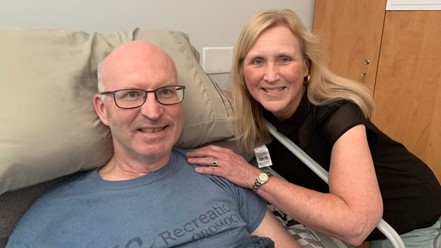In January of this year, a White Coat Black Art CBC podcast hosted by Dr. Brian Goldman highlighted an important discussion around Powers of Attorneys.
https://www.cbc.ca/listen/live-radio/1-75/clip/16034958 https://www.cbc.ca/listen/live-radio/1-75/clip/16034958
In this episode, Dr. Mary Jarratt, a family physician in Saint John, NB, shares warnings around her personal experience as a Power of Attorney. Her brother, Billy Jarratt, suffered a massive hemispheric stroke at the age of 58 that left him in a wheelchair and unable to speak. Fortunately, in 2018, when updating his will, Billy also designated his sister as his Power of Attorney for Property and Care, should anything happen to him.
To quote an accompanying CBC article (https://www.cbc.ca/radio/whitecoat/power-of-attorney-canada-1.7086725)
“Mary is a family physician from Saint John — and therefore familiar with Power of Attorney situations — but she says she still underestimated what’s involved. Now she’s calling for more awareness of the topic and easier access to resources for Canadians to help them make informed decisions about Power of Attorney, and to help them prepare to take over if needed. “
As a wealth management firm, Tall Oak Capital Advisors provides holistic advice to clients. We have many discussions with our clients around risk management and estate planning. We maintain ongoing dialogue to ensure that clients have wills (primary and secondary) in place and that we have a copy on file. As these discussions progress, we often remind clients to also put in place or update their Power of Attorney documents. As part of a client’s risk and wealth strategy, a good way to think of Powers of Attorney, is as a complement to disability insurance.
While wills can be viewed as a complement to life insurance, this podcast reminds us of the importance of these documents, and these conversations. Dr. Jarratt’s call for more awareness and easier access to resources, prompted this article.
What is a Power of Attorney?
According to the Government of Canada: a Power of Attorney is a legal document that gives one person, or more, the authority to manage your money and property on your behalf. In most of Canada, the person you appoint is called an “Attorney.” That person does not need to be a lawyer. Among other requirements, you must be mentally capable at the time you sign any type of Power of Attorney for it to be valid. In general, to be mentally capable means that you can understand and appreciate financial and legal decisions and understand the consequences of making these decisions. However, the legal definition of mental capacity will vary based on the laws in each province or territory.
There are two primary types of Power of Attorney: one that deals with property, and one that deals with personal care, and while there are provincial differences to be aware of, the general application of Power of Attorney documents has similarities across Canada. In Ontario for example, there are the following types: A Power of Attorney for Property which can be either continuing or non-continuing. A Continuing Power of Attorney for Property (CPOA) covers your financial affairs and allows the person you name to make decisions for you even if you become mentally incapable. A non-continuing Power of Attorney for Property covers your financial affairs but cannot be used if you become mentally incapable.
You might give this Power of Attorney if you need someone to look after your financial transactions while you’re away from home for an extended period. A Power of Attorney for Personal Care (POAPC) covers your personal decisions, such as housing and health care. This is sometimes also referred to as a Living Will.
As the White Coat Black Art podcast reminds us, it is important to have these documents in force should something happen, and you are no longer able to manage your affairs.
Who to appoint to be your Attorney?
You may choose your spouse, a close friend, a family member, or anyone else that you trust. Careful consideration as to whether they are the best choice to manage your money and property is very important. They will have access to your money and property, and/or will be making profound and important decisions about your health and quality of life. They should have your best interests at heart. The minimum legal age for an Attorney varies according to the province or territory where you live. In Ontario, for a Power of Attorney for Property, an Attorney must be at least 18 years of age, and for a Power of Attorney for Personal Care, at least 16 years old.
The person you ask to be your Attorney can refuse to act for you, so it is important to ask the person first if they are willing to take on this responsibility and everything that it entails. You should also consider appointing a substitute Attorney in case the first Attorney can no longer act for you.
A few traits to consider when appointing an Attorney include:
- Trustworthy
- Organized
- Knowledgeable about your situation, values, beliefs and wishes
- Financial literacy (especially for Power of Attorney for Property)
- Emotional fortitude
- Willingness to accept the role
- Proximity (geographical proximity can be very helpful)
It is a good idea to talk to the person you wish to appoint and make sure they are willing to accept the responsibility involved in being your attorney for property. The danger of not doing this is highlighted by Dr. Jarratt’s situation in having the responsibility to become attorney for her brother but not having had the opportunity to discuss his wishes with him ahead of time.
Looking back, Mary said she regrets not talking to her brother sooner about his wishes. She wants others to avoid the same pain. “If someone asks you to be POA, spend an hour sitting down with them just getting an idea of what their wishes would be and maybe some basics about their finances, about their house … and what they would want for their children. “
If you want more than one person involved in your financial decisions, you can name more than one person to be your Power of Attorney for Property. However, this may cause other issues such as possible disagreements between your Attorneys. You also can name a substitute Attorney should your primary refuse, resign, get ill, or die.
When do they come into effect and where to keep them?
A Power of Attorney for Property usually comes into effect immediately upon execution unless the document specifies otherwise. However, a Power of Attorney for Personal Care does not come into effect until the grantor is no longer capable of making decisions. When someone can make some decisions (for example, able to bathe and dress, but not able to decide where to live), their Attorney would only be able to make decisions that they themselves are not able to make.
Because these Powers of Attorney have different effective dates, many choose to store them differently. Given the nature of a Power of Attorney for Property and the fact that it is generally effective as soon as it is signed and witnessed, the original documents are not usually kept in an accessible place. Instead, clients often decide to leave originals with their lawyer. On the other hand, an original Power of Attorney for Personal Care is often stored in an accessible place to ensure it is readily available when needed. An original copy may also be stored with the lawyer. At Tall Oak Capital Advisors, we ask our clients to provide us with a copy so that we know who the appointed Attorney is and can help locate the originals.
What does it mean to be an Attorney?
On this CBC show, the host Dr. Brian Goldman interviews Michelle McDonald, the CEO of Brain Injury Canada. Her comments on the duties of an Attorney are worth repeating.
She states that on top of their regular family care-giver duties, attorneys seem to have endless other duties that include:
- Managing large settlements
- Managing daily expenses
- Assisting with daily living needs
- Planning for the future
- Helping to access community supports
She summarizes it as Attorneys, effectively overseeing the overall life of the person for whom they have taken responsibility. Attorneys must always act diligently and in good faith for the person’s benefit.
Some of the duties of an Attorney for Property include:
- Paying bills and collecting any money that is owed
- Managing bank accounts and investments
- Managing and/or selling property as needed
- Filing annual income taxes
- Making decisions about healthcare including end of life decisions (typically, respecting the wishes and direction of the person for whom they are making decisions)
- Making decisions about housing (for example, booking an in-home caregiver)
- Making decisions about nutrition, clothing, and other personal needs
Other responsibilities could also include consulting with supportive family members and friends, keeping accounts of all transactions involving the property, determining whether the person has a will and if so, what the contents are, making expenditures from the person’s assets that are necessary for their support, education, and care and for that of any legal dependents.
What are some other resources?
https://www.ontario.ca/page/make-power-attorney
https://www.publications.gov.on.ca/store/20170501121/Free_Download_Files/300629.pdf
For further inquiries related to Powers of Attorney or how this conversation might apply to your personal situation, please do not hesitate to contact your Tall Oak team.
We’re here to assist you every step of the way.
The views expressed in this commentary are those of Tall Oak Capital Advisors as at the date of publication and are subject to change without notice. This commentary is presented only as a general source of information and is not intended as a solicitation to buy or sell specific investments, nor is it intended to provide tax or legal advice. Statistics, factual data and other information are from sources Tall Oak believes to be reliable but their accuracy cannot be guaranteed. This commentary is intended for distribution only in those jurisdictions where Tall Oak Capital Advisors are registered. Securities-related products and services are offered through Raymond James Correspondent Services Ltd., member Canadian Investor Protection Fund. Insurance products and services are offered through Gryphin Advantage Inc., which is not a member-Canadian Investor Protection Fund. This commentary may provide links to other Internet sites for the convenience of users. Tall Oak Capital Advisors is not responsible for the availability or content of these external sites, nor does Tall Oak Capital Advisors endorse, warrant or guarantee the products, services or information described or offered at these other Internet sites. Users cannot assume that the external sites will abide by the same Privacy Policy which Tall Oak Capital Advisors adheres to.




